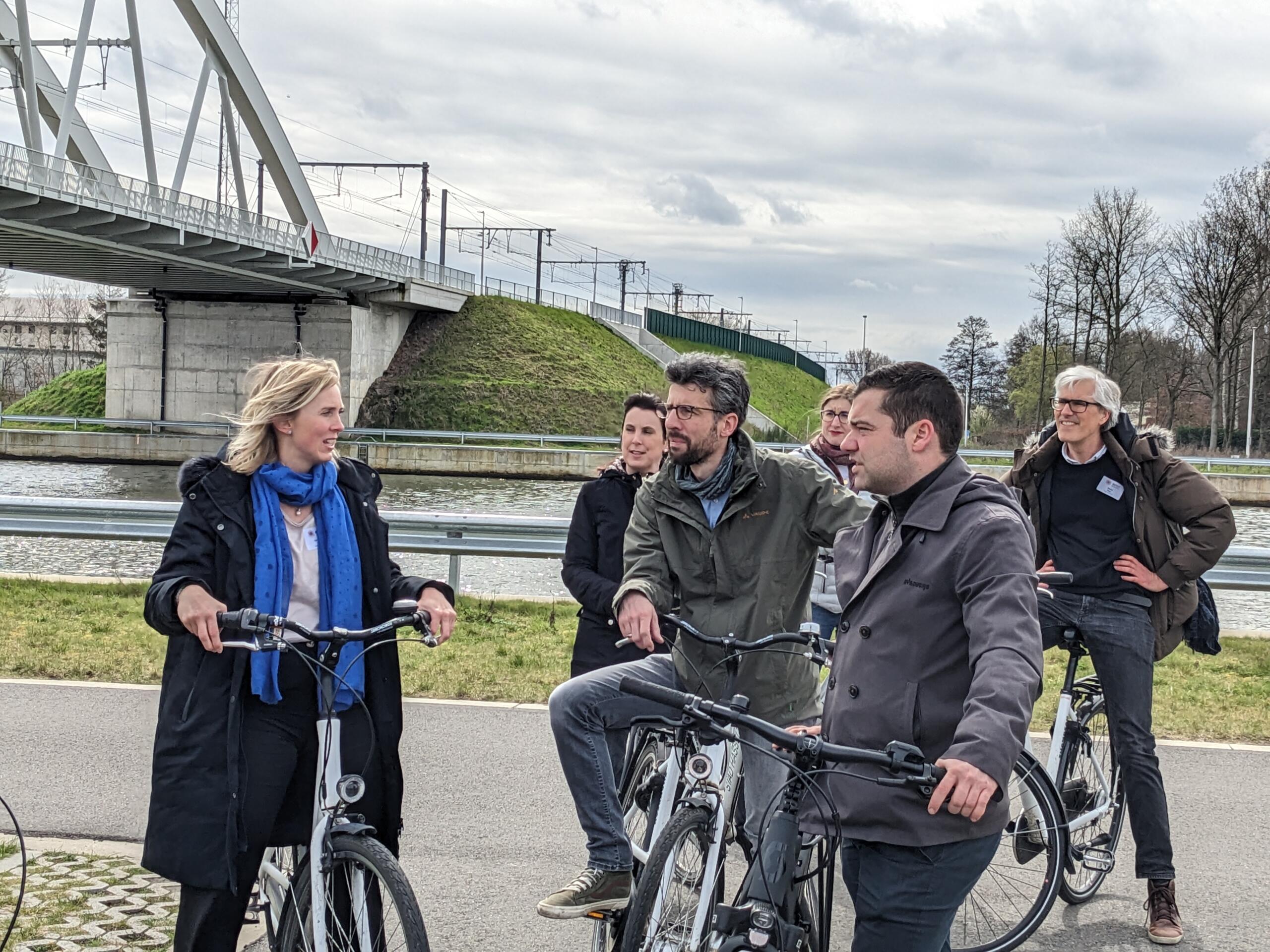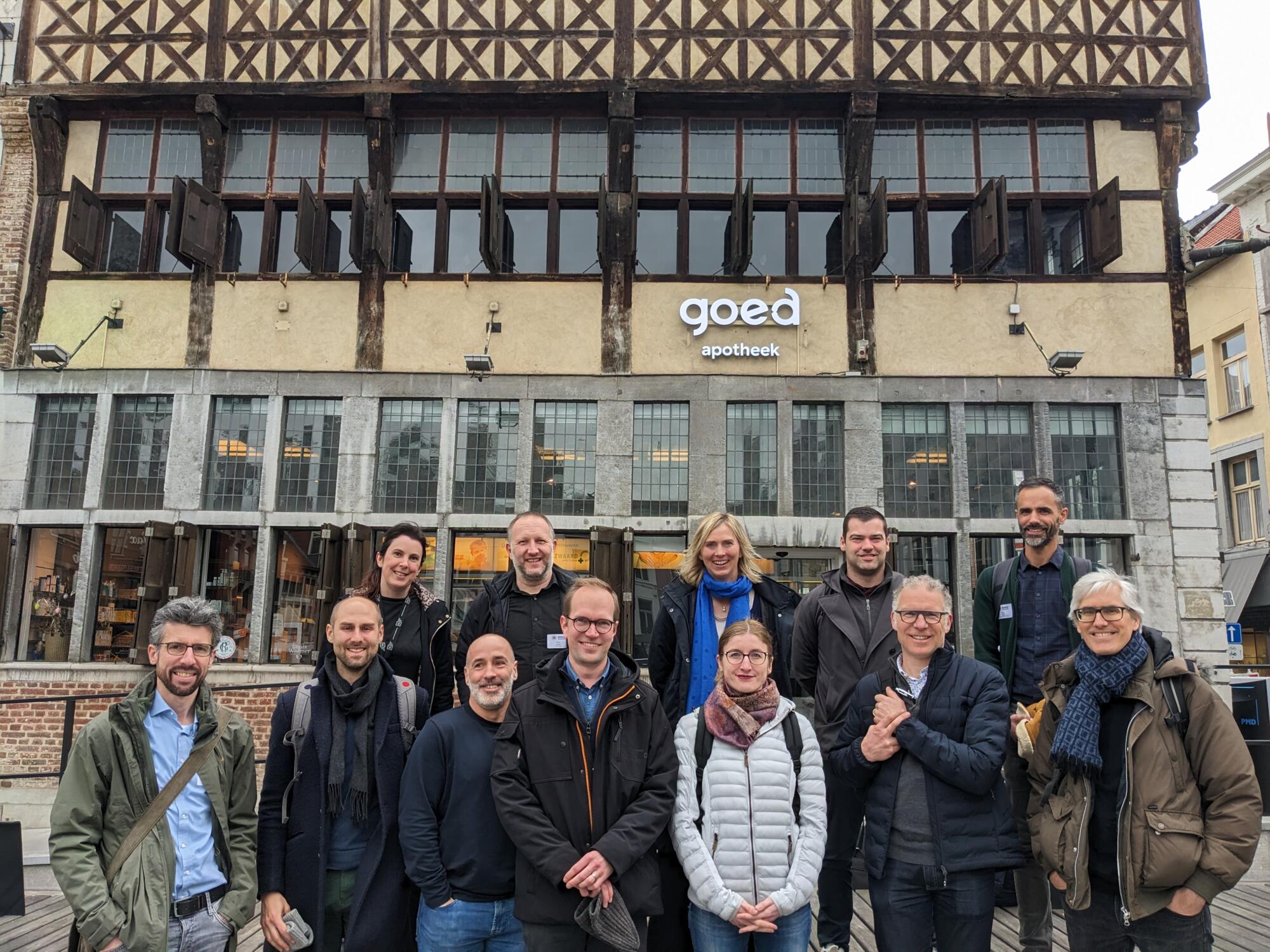2nd EMR Connect Workshop in Hasselt about urban transformation and city accessibility
The second EMR Connect workshop, which was attended by 20 stakeholders from the Euregio Maas-Rhine, took place on 29 March 2023 in Hasselt.
The capital of the Belgian province of Limburg implemented several key initiatives to foster sustainable- and active mobility over the last years, which were presented by several mobility managers throughout the first part of the workshop. A city tour on bikes followed in the afternoon, which allowed participants from Aachen, Liege, Maastricht, Heerlen and other cities across the Euregio to experience the road infrastructure implementations. You can register for the third workshop in Heerlen on 10 May here.
Kicking off works
The 20 participants were greeted by the head of the mobility department Christiane Malina, who introduced the mobility challenges of the Belgian city and several solutions that the administration implemented in recent years. Around 80,000 people are calling the provincial capital their home, which is well-connected to the North- and West of Belgium, but lacks good public transport links to neighbouring Netherlands and Germany. 39,000 employees are commuting to Hasselt every day, which requires a significant amount of parking spaces – both for bikes and cars.
Thus, parking management was a significant task for the city, which invested in P&R facilities, reduced on-street parking and rolled back the car-centric policy of previous decades by pedestrianising large parts of the historic city centre. Furthermore, a circulation plan was introduced to guide traffic out of the historic centre towards the inner ring. Malina highlighted that accessibility needed to be retained by reserving an equal share of parking spaces in the centre for people with disabilities, and short-term- and long-term parking facilities.
Regional steps ahead
Besides investments in active mobility infrastructure, public transport plans are another essential step to reducing car-dependency. The ‘Spartacus Plan’ will help to connect Hasselt with their neighbours in The Netherlands and Belgium, including Maasmechelen, Maastricht and Bree. The initial plan was to build three tram lines, which were altered to a rapid electric ‘tram bus’ system, which is expected to start operations in 2024. Mobility expert and presenter Yannick Fabbro emphasised that cross-border mobility is challenging as the first plans for the tram network started in 2004, nearly two decades ago. Nevertheless, the planned regional network will enable students and commuters to travel much faster from and to Hasselt.
To take advantage off the significant change that will be brought by the regional ‘tram bus’ network, the city administration decided to transform the urban environment around the planned bus stops, which include pedestrian bridges, pedestrianized areas, new parks and an enhancement of the local cycling network. Mobility hubs will be created to allow a smooth transition of different transport modes. Sev eral of these transformation areas were shown during the site visits in the afternoon.
eral of these transformation areas were shown during the site visits in the afternoon.
Another essential element to reduce congestion is the connection of P&R facilities with the city centre. One example that was showcased is ‘Park H’, an event centre on the outskirts of Hasselt with 2500 parking spaces, which will be connected to the city by bus. Furthermore, a mobility point for e-scooters and shared bikes will be created. Similar solutions will be installed in other areas of the city. Besides these efforts, the car-centric infrastructure in the city centre of Hasselt is being adapted for active mobility, while remaining ‘accessibility for everyone’.
Accessing the city
Fabbro and Malina highlighted that the selection of the ‘right terminology’ was an essential step to boost public support and avoid negative repercussions. Thus, the term ‘car-free city centre’ was not used in the communication with the citizens of Hasselt, of which 1500 participated in a survey to gather feedback for the urban mobility plan of the Belgian city to gain an overview of the wants and needs of the citizens. The plans to reduce negative externalities of passenger cars, which were partially implemented by the time of the workshop, include solutions such as one-way streets, pedestrian zones with dedicated loading- and unloading times for freight, as well as speed limits for residential areas of 20km/h.
Various examples from across Europe have shown that physical barriers are often one of the best solutions to enforce city access. Even though these retractable pollards might be a relatively costly investment, they help to filter traffic. Around 40 of these installations were made across Hasselt, which allows around 5000 permit holders to pass through the retractable barriers, which can be lowered with a physical badge, a code or by automatic number plate recognition (ANPR). Permissions are either given out to ‘official vehicles’ from the police or firefighters, to people with reduced mobility, or freight transports with deliveries to shops in the city centre. The entire system is managed by five full-time staff members, who are handling accessibility and issue permits.
More to come
Additional presentations were given by the hosts of the other workshops, namely Aachen (February), Heerlen (10 May) and Liege (June). Heerlen invited the participants to join the workshop to discuss local and regional shared mobility solutions, as well as local projects to reduce the impact of cars in Heerlen.
Furthermore, the presentation of Liege focused on the regional bus station of Eupen, a local city in the proximity of Liege, which is operated by the regional public transport provider ‘TEC’. Besides the bus station, the regional transport provider will also operate a tram line in Liege, which is currently under construction and is planned to open in 2024. Whereas the tram in Liege will need many months to complete, the Eupen bus station or ‘Bushof’ in German will be finished by autumn. The upgrade of the station will include a point of sale, a bike garage, facilities for bus drivers and additional information for users.
As the organisers of this cooperation project between Euregio cities, Rupprecht Consult and POLIS Network invite you to register for the third workshop, which will take place in Heerlen on 10 May. You can find all presentations as PDFs on the right of this news item.
